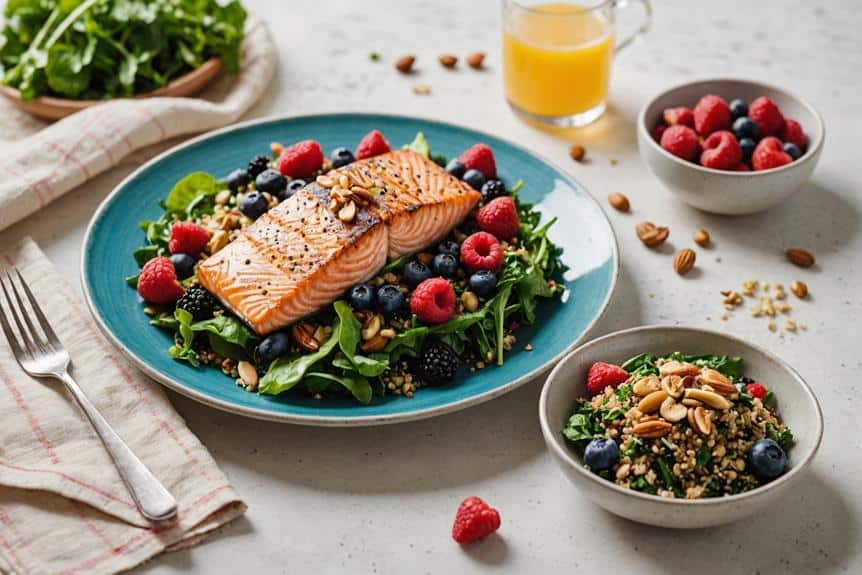A healthy diet for seniors emphasizes nutrient-rich foods that help maintain overall health and prevent diseases. You should include a variety of fruits and vegetables, aiming for at least 5 servings daily, along with whole grains, lean proteins, and dairy for calcium and vitamin D. Staying hydrated is essential; aim for 6-8 glasses of water each day. Additionally, practice portion control and limit salt and sugar intake to manage blood pressure and weight. By making these dietary choices, you can improve your quality of life and flexibility in meal planning can fit your needs. There's much more to explore on this topic.
Unique Nutrition Needs
In addition to protein, it's essential to pay attention to fundamental nutrient timing. Consuming a balanced mix of nutrients throughout the day helps optimize your body's function. Aim to include a variety of fruits and vegetables in your meals, particularly those rich in fiber, which can aid in blood sugar control and overall health. This approach guarantees you receive critical vitamins and minerals, which can lower your risk of diseases like high blood pressure and diabetes, as noted in diabetes-friendly meal planning. Hydration is another key aspect. You might not feel thirsty as often, but drinking 6-8 glasses of water daily helps prevent dehydration.
Don't forget to prioritize significant vitamins and minerals such as calcium, vitamin D, and vitamin B12. These nutrients play essential roles in maintaining bone health, immune function, and red blood cell production. To make healthy eating easier, consider incorporating convenient, nutrient-dense foods into your diet. Pre-cut fruits and vegetables can enhance your meal enjoyment and help you meet your nutritional needs, even if shopping or cooking becomes challenging.
Recommended Food Groups
Start with vegetables, aiming for about 75g per serving, which is roughly ½ cup of cooked green or orange veggies or beans. These colorful foods are packed with vitamins and minerals, offering high nutrient density. For fruits, aim for about 150g, equivalent to a medium apple or two kiwifruits. Fruits provide essential vitamins and antioxidants that support overall health.
When it comes to grains, focus on whole grains. A serving should be around 500 kJ, which translates to one slice of bread or ½ cup of cooked porridge. Whole grains provide sustained energy and fiber, which is significant for digestion.
Protein is also essential, especially for muscle maintenance. Aim for 500-600 kJ per serving, equal to about 65g of cooked lean red meat or two large eggs. These protein sources help keep your muscles strong and support various bodily functions.
Don't forget dairy! It's a great source of calcium and vitamin D, important for bone health. Remember to practice portion control to avoid overeating, but make sure your meals are rich in nutrient density. Balancing these food groups will help you maintain your health and well-being as you age.
Meal Planning Strategies
When meal prepping, consider your individual caloric needs. It's always smart to consult with healthcare providers before making significant dietary changes. You'll want to guarantee that your meals are not only healthy but also suitable for your lifestyle. Quick meals can be prepared in five minutes or less, perfect for busy days, while more elaborate dishes can be reserved for special occasions. This flexibility allows you to accommodate different cooking preferences and time constraints.
Incorporating portion control techniques is essential for maintaining a balanced diet and achieving your dietary goals. Learn about healthy food swaps to replace less nutritious ingredients, making your meals both satisfying and wholesome. For example, swapping white rice for quinoa can boost your meal's nutritional value while controlling portions effectively.
Importance of Hydration
It's important to recognize the signs of dehydration, which include dark urine, headaches, confusion, and lack of concentration. These symptoms can severely impact your daily functioning. During warm weather or when you're engaged in physical activities, your fluid needs may increase, so keep an eye on your hydration status.
To guarantee you stay hydrated, consider these hydration tips: always carry a water bottle, set reminders to drink, and incorporate fluid sources like fruits and vegetables into your meals. Foods like watermelon, cucumbers, and oranges can contribute considerably to your overall fluid intake. Additionally, herbal teas or broths can be invigorating options that help meet your hydration goals.
If you experience persistent dehydration symptoms or have concerns about your fluid intake, consulting a healthcare provider is advisable. Staying hydrated is a simple yet effective way to enhance your health, energy levels, and overall quality of life, so make it a priority every day.
Dietary Adjustments
Here's a quick reference table to help you with some important dietary adjustments:
| Dietary Adjustment | Recommendation |
|---|---|
| Portion Control | Smaller, frequent meals |
| Salt Intake | Limit to under 6g per day |
| Sugar Intake | No more than 30g per day |
| Convenient Meal Options | Use tinned, frozen, or pre-prepared foods |
| Alcohol Consumption | Limit to up to 14 units per week |
Reducing salt intake is essential for managing blood pressure, so be sure to read labels on processed foods for sodium content. Lowering sugar intake to no more than 30 grams daily can help manage weight and reduce diabetes risks. Consider incorporating convenient meal options like tinned or frozen foods, as they can be nutritious and easy to prepare, supporting your dietary adherence. Finally, keep an eye on your alcohol consumption, limiting it to avoid health complications and interactions with your medications.





